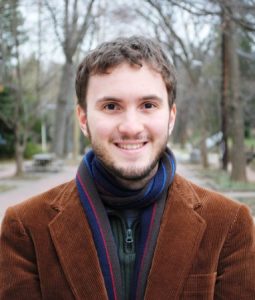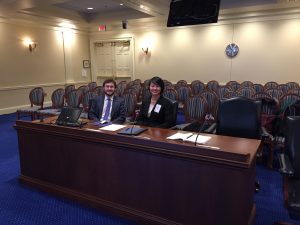Ben Davis is a 4th year PhD Candidate in the Department of Environmental Health Sciences at the Johns Hopkins Bloomberg School of Public Health. His research interests include applying geostatistical methods to predict infectious microorganisms in water. Specifically he is modeling the presence and concentration of Vibrio parahaemolyticus in shellfish in the Chesapeake Bay. His experience in food safety, environmental epidemiology, remote sensing, risk assessment and science policy have prepared him to undertake this work and will continue to support him throughout this scientific career.
EDUCATION AND TRAINING
Expected August 2017 Doctor of Philosophy (Ph.D.), Department of Environmental Health Sciences, Program in Environmental Health Engineering, Johns Hopkins Bloomberg School of Public Health (JHSPH), Baltimore, MD
Dissertation: Characterizing the Spatial-Temporal Dynamics and Human Health Risks of Vibrio parahaemolyticus Bacteria in Estuarine Environments
May 2014 Risk Sciences and Public Policy Certificate, Risk Sciences and Public Policy Institute, Johns Hopkins Bloomberg School of Public Health (JHSPH), Baltimore, MD
May 2010 Bachelor of Arts (B.A.), Neuroscience and Behavior, Vassar College, Poughkeepsie, NY
PROFESSIONAL/RESEARCH EXPERIENCE
Mar. 2014 – Mar. 2015 Student Investigator, Center for for a Livable Future, Johns Hopkins Bloomberg School of Public Health (JHSPH), Baltimore, MD
- Conducted an exhaustive literature review comparing the health risks and benefits of consuming raw versus pasteurized milk. Review was requested by the Maryland House of Delegates and findings were presented during the 2015 legislative session (Dr. Keeve Nachman)
May. 2013 – Aug. 2014 Principle Investigator, “Mapping Aquaculture in Maryland and the Chesapeake Bay“, Aquaculture, Public Health, and the Environment, Center for a Livable Future, Johns Hopkins Bloomberg School of Public Health (JHSPH), Baltimore, MD
- Collected spatial data concerning oyster aquaculture in the Chesapeake Bay. Transformed data into a Geographic Information System (GIS) and performed exploratory spatial-temporal analyses on collected data.
Sept. 2010 – Mar. 2012 Post-baccalaureate Intramural Research Training Award (IRTA) Fellow. Laboratory of Epidemiology, Demography, and Biometery, Neuroepidemiology section, National Institute on Aging, National Institutes of Health (NIH), Bethesda, MD.
- Performed secondary analysis on the longitudinal cohort AGES. Performed multivariate regressions in SAS to study the effects of moderate alcohol intake on cognition and on brain volume (Dr. Lenore Launer)
PROFESSIONAL ACTIVITIES
Feb. 2016 Written Testimony. Maryland House Bill 79 – Health – Milk Products – Raw Milk – Consumer–Owned Livestock
Jun. 2014 – May. 2015 President, Environmental Health Sciences Student Organization (EHSSO), Department of Environmental Health Sciences, Johns Hopkins Bloomberg School of Public Health (JHSPH), Baltimore Maryland
- Coordinated and led monthly board meetings, Organized social, volunteer, continued learning, and professional training events for department students, faculty, and staff.
FELLOWSHIPS, HONORS, AND AWARDS
Sept. 2012- Aug. 2017 Center for a Livable Future (CLF) – Lerner Fellowship, Johns Hopkins Bloomberg School of Public Health
Sept. 2014- Dec. 2015 Environment, Energy Sustainability and Health Institute (E2SHI) Fellowship, Johns Hopkins University
May 2015 Delta Omega Scholarship Winner, “Measurement Category”, Alpha Chapter of the Delta Omega Honorary Public Health Society, Johns Hopkins Bloomberg School of Public Health.
PUBLICATIONS
Journal Articles
Davis, B.J.K., Vidal, J. S., Garcia, M., Aspelund, T., van Buchem, M. A., Jonsdottir, M. K., … & Launer, L. J. (2014). The Alcohol Paradox: Light-to-Moderate Alcohol Consumption, Cognitive Function, and Brain Volume. The Journals of Gerontology Series A: Biological Sciences and Medical Sciences, glu092.
Albanese, E., Davis, B., Jonsson, P. V., Chang, M., Aspelund, T., Garcia, M., … & Launer, L. J. (2015). Overweight and Obesity in Midlife and Brain Structure and Dementia 26 Years Later: The AGES-Reykjavik Study. American Journal of Epidemiology, kwu331.
Technical Reports
Davis, B.J.K. , Li, C.X., & Nachman, K.E. (2015). A literature review of the risks and benefits of consuming raw and pasteurized cow’s milk: A response to the request from The Maryland House of Delegates’ Health and Government Operations Committee. Johns Hopkins Bloomberg School of Public Health’s Center for a Livable Future. http://www.jhsph.edu/research/centers-and-institutes/johns-hopkins-center-for-a-livable-future/_pdf/research/clf_reports/RawMilkMDJohnsHopkinsReport2014_1208_.pdf
RESEARCH FINDINGS TRANSLATION TO INFORM POLICY AND PRACTICE
Feb. 2015 Davis, B.J.K. , Li, C.X., & Nachman, K.E. “The Health Risks and Benefits of Consuming Raw versus Pasteurized Milk: A Scientific Literature Review” Maryland General Assembly, Public Health and Minority Health Disparities Committee, Annapolis, MD.
TEACHING EXPERIENCE
Academic Year 2015-16 Gordis Teaching Fellow, Undergraduate Public Health Studies Program, Krieger School of Arts & Sciences, Johns Hopkins University, Baltimore, MD.
- Course Title: Telling Public Health Stories through Maps
- Course Enrollment: 15
PRESENTATIONS
Invited Seminars
Apr. 2015 Davis, B.J.K. “Use of Spatial Statistics to Predict Vibrio parahaemolyticus in the Chesapeake Bay“. 67th Annual Interstate Seafood Seminar, Ocean City, MD
Nov. 2013 Davis, B.J.K. “Using GIS on the Chesapeake Bay” Johns Hopkins Bloomberg School of Public Health’s GIS Day, Baltimore, MD
Sept. 2013 Davis, B.J.K., Love, D., & Curriero, F.C. “Oyster Aquaculture, The Environment and Public Health” Maryland Department of Natural Resources, Aquaculture Division, Annapolis, MD.
Scientific Meetings
Apr. 2015 Davis, B. “Predicting infectious diseases from microorganisms in the Chesapeake Bay” Green Research and Sustainability Symposium, Environment, Energy, Sustainability & Health Institute (E2SHI), Johns Hopkins University, Baltimore, MD
Nov. 2014 Davis, B.J.K., Curriero, F.C. “Oyster Aquaculture and the Chesapeake Bay: Building a GIS, Exploring Trends, and Generating Hypotheses. Johns Hopkins Bloomberg School of Public Health’s GIS Day, Baltimore, MD
Sept. 2011 Davis, B., Vidal, J.-S., Zhang, J., Launer, L. “The alcohol paradox: The effects of alcohol consumption on brain volume and cognitive function in an aging Icelandic population“. National Institutes of Health Research Festival, Bethesda MD.
SOFTWARE AND PROGRAMMING EXPERTISE
Programming Languages
- R
- SAS
- STATA
- LaTeX
- Markdown
- HTML
- SQL
Software
- ESRI’s ArcGIS
- QGIS
- ERDAS Imagine
- Rstudio
- SaTScan
- SeaDas
- Microsoft Office Suite
- EndNote



![DSC_0139[1] copy](https://igert.wse.jhu.edu/wp-content/uploads/2016/04/DSC_01391-copy-291x300.jpg)
